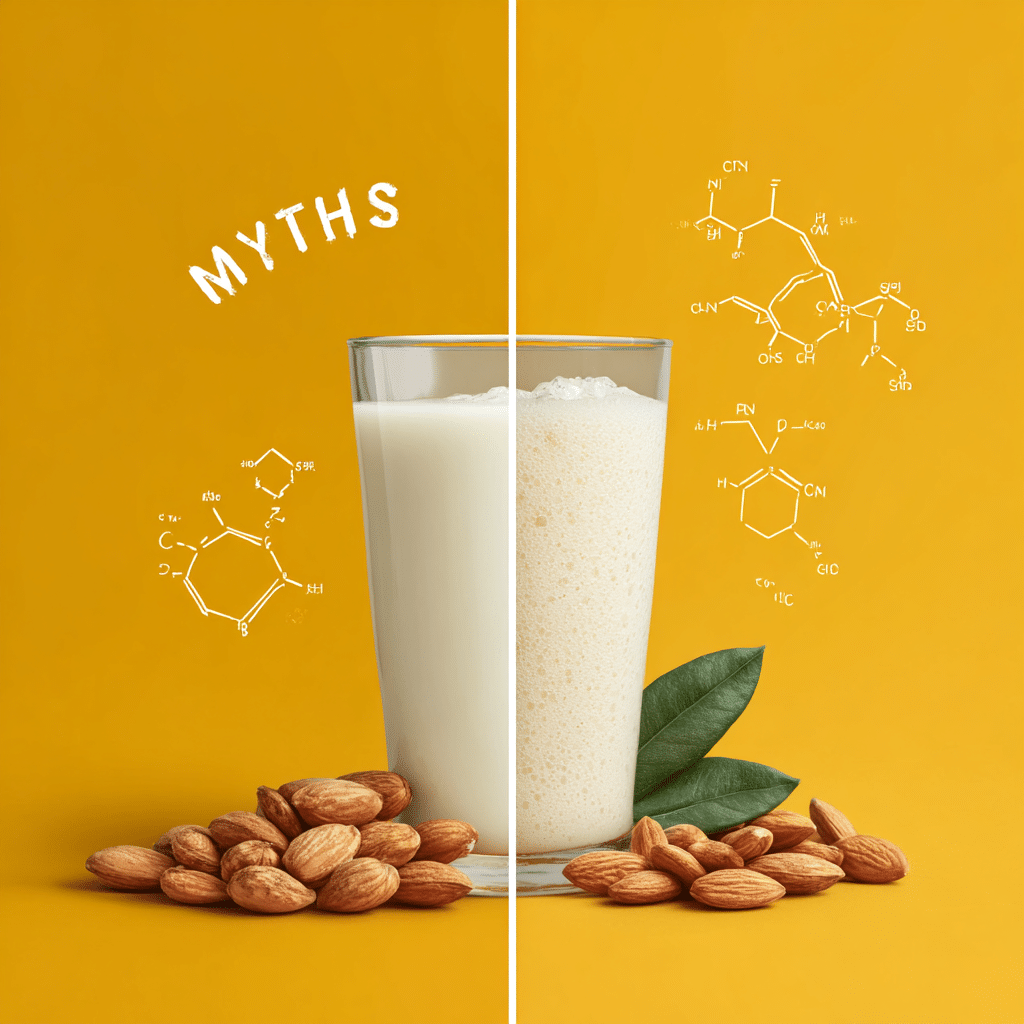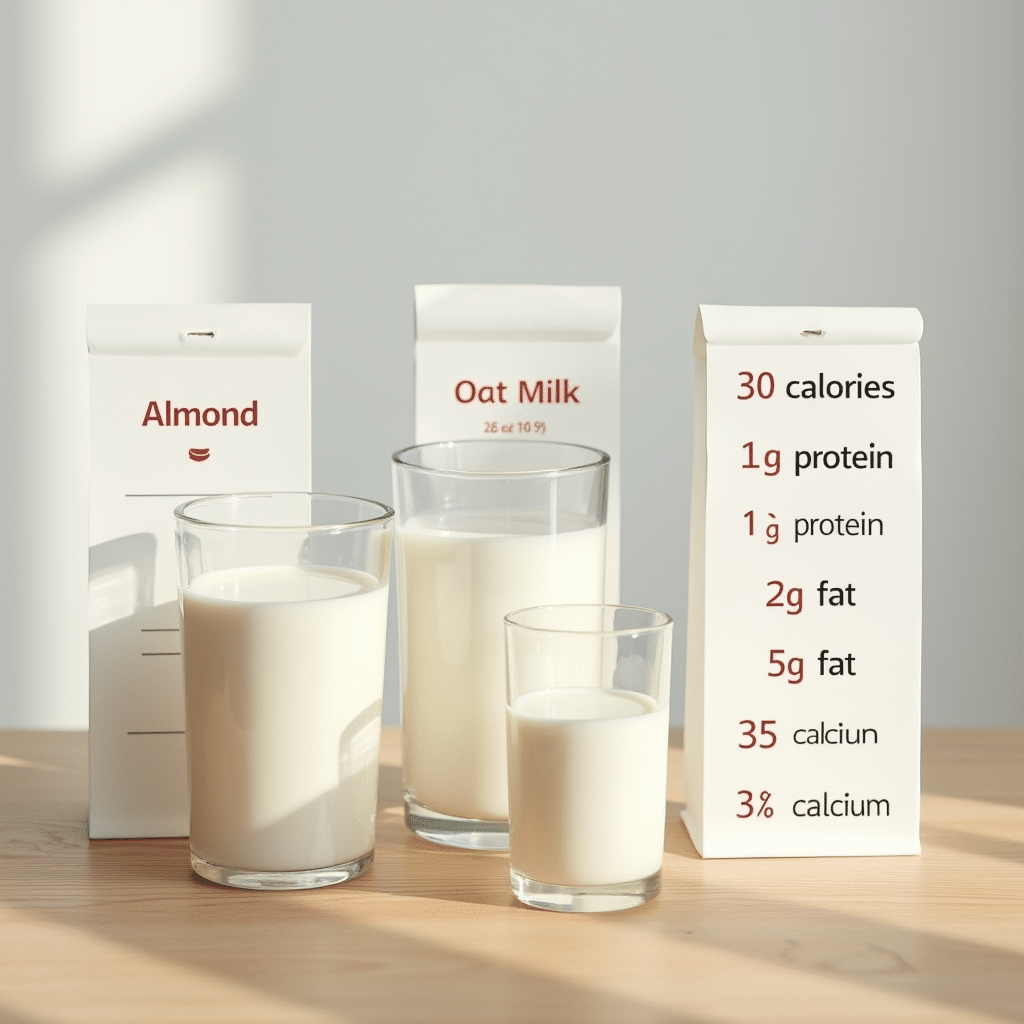Is almond milk healthy, or just another label-friendly product sitting next to oat and soy milk? With its rise in popularity, more people are asking if almond milk is truly good for the body—or just good for sales. In this guide, we’ll unpack what’s behind almond milk’s health claims. We’ll compare it to dairy milk, explore its real benefits, and break down the myths. If you’ve ever stood in the milk aisle wondering is almond milk healthy or just trendy, this article is for you.
Table of Contents
Table of Contents
The Moment I Started Wondering—Is Almond Milk Healthy?
A Change That Started With Coffee
I didn’t become an almond milk fan overnight. It started the day I realized dairy no longer agreed with me. After my usual coffee started leaving me bloated, I gave almond milk a try. At first, I wasn’t sure what to expect. But it tasted fine—and more importantly, it didn’t leave me feeling off. That was my turning point.
I kept using it. First in smoothies, then in my cereal, and eventually in cooking. But as almond milk slowly replaced cow’s milk in my routine, one question stayed in the back of my mind: Is almond milk healthy, or am I just swapping one processed food for another?
Why People Assume Almond Milk Is Always Healthy
There’s no doubt almond milk has a great reputation. It’s low in calories, lactose-free, and plant-based. On the surface, that sounds like a win. But is almond milk healthy by default? Not always.
Some versions are loaded with added sugar and preservatives. Others are fortified with calcium and vitamins D and E. It really depends on the brand and the label. A vanilla-flavored almond milk with cane sugar and thickeners? Not the same as unsweetened almond milk with a clean list of ingredients.
Still, the phrase is almond milk healthy gets searched thousands of times every month. People want real answers. And that’s what we’re covering here—without hype. From daily use to fat content and comparisons with dairy, we’ll look at what science and nutrition facts actually say.

Almond Milk Smoothie
Ingredients
Method
- In a high-speed blender or food processor, add almond milk, frozen banana, and almonds. Blend until thick and smooth.
- Add the cinnamon and ice, then blend again until your desired consistency is reached.
- Pour into glasses and enjoy immediately.
Nutrition
Notes
- You can use any unsalted nuts or seeds as a substitute.
- To store: Best enjoyed within 1–2 hours, or store in the fridge up to 2 days. Stir well before drinking.
- To freeze: Freeze in ice cube trays or bags for up to 6 months. Reblend before serving.
Tried this recipe?
Let us know how it was!What Makes Almond Milk Healthy—or Not?
The Benefits: Why Almond Milk Gets a Health Halo
Let’s start with why people ask, is almond milk healthy, in the first place. Many of the perks are real, especially when you choose the right version. Here’s what makes almond milk a smart choice for a lot of people:
- It’s low in calories. Unsweetened almond milk often has just 30 to 40 calories per cup—compared to 120+ in whole milk.
- It’s dairy-free and lactose-free. This makes it ideal for people with intolerances or sensitive digestion.
- It’s cholesterol-free. That’s a big plus for heart health, especially if you’re replacing full-fat dairy.
- It’s usually fortified. Many store brands include calcium, vitamin D, and sometimes vitamin E—essential for bone strength and immune support.
These are all reasons why almond milk is a go-to in plant-based diets and weight-conscious routines. It’s also an easy way to cut back on saturated fat while keeping meals light. If you’re asking is almond milk healthy for daily use, the answer is often yes—especially when it replaces sugary or full-fat options.
You’ll even find that some varieties include added protein or pea protein to help balance the nutritional profile.
The Drawbacks: When Almond Milk Isn’t So Great
But let’s be honest—is almond milk healthy in every case? Not exactly. There are some real limitations to keep in mind:
- Low in protein. Standard almond milk only has about 1g of protein per cup—far less than dairy (8g) or soy (7g).
- Some versions are high in sugar. Flavored options, especially vanilla or chocolate almond milk, can sneak in 7–13 grams of added sugar.
- It’s not always nutrient-dense. If your almond milk isn’t fortified, it may be lacking in key vitamins and minerals you’d normally get from milk.
Another thing to consider is allergens. While rare, almond milk is made from nuts—so it’s not safe for everyone. If your body needs more protein, or if you’re buying a version without added calcium or D, the benefits may not stack up the same.
That’s why we always suggest checking the label. Choosing an unsweetened, fortified option makes all the difference when you’re asking is almond milk healthy for long-term use.
You can compare these numbers yourself by visiting our full almond milk nutrition breakdown or looking at Silk vanilla almond milk facts to see how different brands stack up.
How Often Should You Drink Almond Milk?
Can You Drink Almond Milk Every Day?
One of the most common questions people have is: Is almond milk healthy enough to drink daily? For most people, yes. In fact, drinking a cup or two each day can be part of a balanced diet—especially if you’re choosing unsweetened and fortified versions.
Here’s why almond milk works for everyday use:
- It’s easy on digestion, especially for those sensitive to lactose.
- It adds variety to smoothies, coffee, oatmeal, and recipes without piling on calories or sugar.
- If it’s fortified, it can help meet your calcium and vitamin D needs—two nutrients many Americans fall short on.
Still, variety matters. While almond milk is healthy, it’s not rich in protein. So if you drink it every day, be sure your meals include protein from other sources like nuts, tofu, lentils, or eggs (if not vegan). Drinking almond milk daily isn’t a concern—it just works best when part of a well-rounded eating plan.

Best Times and Ways to Use It
If you’re wondering is almond milk healthy in any form, the answer depends on how you use it. Here’s when and where it works best:
- In the morning: Use it in smoothies or coffee for a creamy texture without the heaviness of dairy.
- As a light snack base: Blend it with fruit and nut butter for a quick, satisfying shake.
- In cooking: Almond milk holds up well in sauces, soups, and baking when used in place of dairy.
Need ideas? Try our Silk almond milk smoothie recipe—a favorite that’s low-sugar and packed with flavor.
When asking is almond milk healthy long term, these little swaps show how it can support a lighter, cleaner lifestyle without much effort.
One tip: always shake the carton before using. Natural separation is normal, and mixing it helps distribute the nutrients evenly—especially if it’s calcium-fortified.
Frequently Asked Questions
Is it OK to drink almond milk daily?
Yes, for most people, it’s perfectly fine to drink almond milk every day. It’s low in calories, lactose-free, and often fortified with nutrients like calcium and vitamin D. Just be sure to choose unsweetened varieties and pair them with a diet that includes protein and fiber.
Is almond milk actually healthier than regular milk?
It depends on your needs. Almond milk is healthier if you’re avoiding dairy, limiting calories, or watching cholesterol. But regular milk has more protein and is naturally rich in nutrients like B12. When asking is almond milk healthy compared to cow’s milk, it really comes down to your dietary goals.
Which milk is healthiest?
There’s no one “healthiest” milk—it depends on your body and lifestyle. Almond milk is healthiest for calorie-conscious and dairy-free diets. Oat milk is great for fiber, while soy milk is high in protein. Cow’s milk is nutrient-rich but contains more saturated fat. The healthiest choice is the one that fits your needs.
Is almond milk a good or bad fat?
Almond milk contains mostly unsaturated fats, which are considered “good fats” that support heart health. It’s naturally low in saturated fat and has zero cholesterol. So if you’re wondering is almond milk healthy in terms of fat, the answer is yes—especially when compared to full-fat dairy.

Want to save these almond milk facts for later? Pin this guide and follow us on Pinterest for easy plant-based ideas and nutrition comparisons.
Final Thoughts
So, is almond milk healthy? In most cases, absolutely. It’s a simple, low-calorie, dairy-free option that supports a clean and flexible eating style. As with any food, it matters what version you buy and how you use it. The unsweetened, fortified options deliver the best health benefits without extra sugar or fillers.
Whether you’re using it daily or just starting to experiment, almond milk can be a smart part of your everyday routine. And if you’re curious about how it compares nutritionally, be sure to check out our almond milk nutrition guide and Silk vanilla almond milk recipe for real-life applications.
Have questions about almond milk or want to share your favorite version? Join the conversation with us on Facebook—we’d love to hear what you’re drinking!

